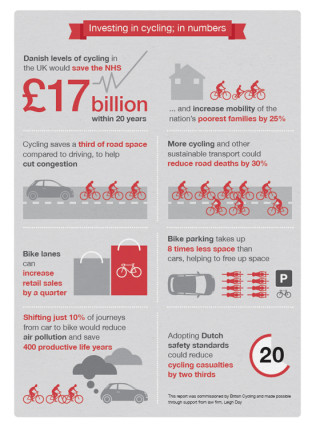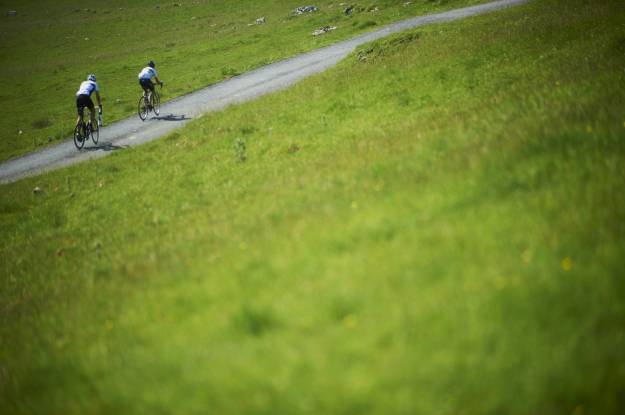To coincide with a parliamentary debate on cycling, British Cycling has today published an academic paper detailing the benefits that more people using bikes to get around would bring to everyone in Britain in association with law firm Leigh Day.
The benefits, compiled by Dr Rachel Aldred of Westminster University, demonstrate that “investing in cycling would make a massive difference to all of society,” said British Cycling policy adviser Chris Boardman.
From saving the NHS £17 billion to increasing the mobility of the nation’s poorest families by 25%, the paper published today demonstrates how cycling would have an overwhelmingly positive effect on everyone, whether they cycle or not.
Commenting on the list of benefits, British Cycling policy adviser, Chris Boardman, said:
“This paper shows that more cycling would touch the lives of all Brits in a positive way – whether they themselves choose to use a bike or not. Investing in cycling would make a massive difference to all of society.
“We only have to look to Denmark and the Netherlands – countries that regularly top surveys on being the happiest and healthiest nations in the world – to see what a transformative effect cycling can have. This is about creating better places to live.
“I hope that this paper helps politicians from all parties to see the bigger picture – that investing in cycling and giving it a proper showing in party manifestos will have long-term benefits for people across Britain.”
Dr Rachel Aldred of Westminster University said:
“The fantastic thing about investing in cycling is that it can generate benefits in a range of policy areas. Whether the goal is quicker urban journeys, improving life chances for low income people, revitalising town centres or reducing the growing burden of non-communicable diseases - cycling can be part of the solution.
“The recommendations in the Get Britain Cycling report provide a starting point. Fundamentally, we need a change in mind-set among politicians and policy-makers. Rather than just telling people they should cycle, we need to create a Britain where it's safe, easy and fun for all ages and abilities to cycle. This requires sustained funding, a step change in infrastructure, and policy, legal, and regulatory changes to redress the traditional bias against cycling within transport policy.”
Penny Knight, head of the cycling team at Leigh Day said:
“This research underlines the tremendous benefit cycling can have to society as a whole.
“We join the calls for the leaders of all political parties to put cycling at the heart of their manifestos and propose greater funding to make cycling a viable alternative for the majority of people in Britain.”
A copy of the report has been sent to every MP ahead of today’s parliamentary debate.
The benefits of more investment in cycling put forward in Dr Aldred’s paper include:
More cycling would save the NHS billions every year
- Danish levels of cycling in the UK would save the NHS £17 billion within 20 years
- Shifting just 10% of journeys in urban areas from car to bike would reduce air pollution and save 400 productive life years
- More cycling means more people get the exercise they need, making for a healthier population
- Cycling can improve psychological well-being - a study in Copenhagen found that cycling helped with stress relief
More people cycling means less congestion and more space on safer roads
- Cycling saves a third of road space compared to driving, to help cut congestion
- Investing in cycling will mean cycling is safer and feels safer
- More cycling and other sustainable transport could reduce road deaths by 30%
- Bike parking takes up eight times less space than cars, helping to free up space
- Achieving Dutch levels of cycle safety could reduce cycling casualties by two thirds
- More people cycling will mean significant drops in air and noise pollution
- Designing well for cycling helps create more liveable, pleasant cities for all
- Cycling means more predictable journey times for people and goods in congested cities
- Planning well for cycling enables a more efficient use of the transport network. On average, each cycle trip is over three times more space efficient per person than each car trip.
More cycling would boost high streets and help Britain’s poorest
- Bike lanes have been demonstrated to increase retail sales by a quarter. In New York City streets with protected bike lanes saw a 24% increase in retail sales.
- Cycling can transform the mobility and life chances of Britain’s poorest – more cycling could increase mobility of the nation’s poorest families by 25%
- Cycling promotes independence in youth and in older age – over two-thirds of Dutch people aged 55-74 get at least half an hour’s exercise five times a week, largely through cycling
To read the full paper, click here.












